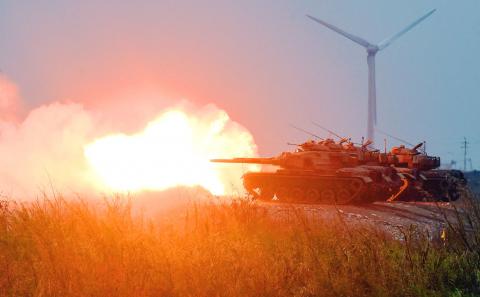The army is to upgrade its M60A3 Patton tanks as part of a five-year plan to build up its combat forces, army generals told Control Yuan President Chang Po-ya (張博雅) at a conference in Kinmen County on June 28.
The conference took place after Chang and members of the Control Yuan National Defense and Intelligence Committee toured an outpost guarded by the Lieyu Defense Team of the Kinmen Defense Command.
When questioned by committee members about the army’s tanks becoming obsolete, the generals told them the military is planning to upgrade its M60A3 tanks, although it has yet to decide the type of upgrades and the number of tanks to be upgraded.

Photo: Liao Chen-huei, Taipei Times
The program is in the early stages of conceptual planning, they said, adding that battle requirements would guide the military in identifying what improvements are needed for its tanks.
Although the Ministry of National Defense plans to buy 108 M1A2 Abrams tanks from the US and has tendered a letter of request to Washington, the bulk of the army’s armored units would continue to be equipped with legacy platforms after the service acquires new tanks.
The army’s frontline tank fleet consists of 480 M60A3s, 450 CM11s, or modified M48 turrets mated to M60 chassis, and 250 CM12s, or C11 turrets mated to M48 hulls, according to the Defense Industry Daily Web site.
The fundamental technology used in the tanks dates back to the 1940s and 1950s, and their 105mm rifled gun is mostly unable to cope with modern battle tanks, while their armor plating does not utilize composite materials used in modern armored fighting vehicles.
The army in 2017 expressed an interest in upgrading its M60A3 tanks with 120mm smoothbore guns, which have replaced 105mm guns in most Western armies, as well as new turrets, turret hydraulics and ballistics computers.
However, the project’s price tag of NT$100 million (US$3.21 million at the current exchange rate) per tank apparently put off top brass and it did not appear in the nation’s defense budget in the years since.

Chinese spouse and influencer Guan Guan’s (關關) residency permit has been revoked for repeatedly posting pro-China videos that threaten national security, the National Immigration Agency confirmed today. Guan Guan has said many controversial statements in her videos posted to Douyin (抖音), including “the red flag will soon be painted all over Taiwan” and “Taiwan is an inseparable part of China,” and expressing hope for expedited reunification. The agency last year received multiple reports alleging that Guan Guan had advocated for armed reunification. After verifying the reports, the agency last month issued a notice requiring her to appear and explain her actions. Guan

A preclearance service to facilitate entry for people traveling to select airports in Japan would be available from Thursday next week to Feb. 25 at Taiwan Taoyuan International Airport, Taoyuan International Airport Corp (TIAC) said on Tuesday. The service was first made available to Taiwanese travelers throughout the winter vacation of 2024 and during the Lunar New Year holiday. In addition to flights to the Japanese cities of Hakodate, Asahikawa, Akita, Sendai, Niigata, Okayama, Takamatsu, Kumamoto and Kagoshima, the service would be available to travelers to Kobe and Oita. The service can be accessed by passengers of 15 flight routes operated by

GIVE AND TAKE: Blood demand continues to rise each year, while fewer young donors are available due to the nation’s falling birthrate, a doctor said Blood donors can redeem points earned from donations to obtain limited edition Formosan black bear travel mugs, the Kaohsiung Blood Center said yesterday, as it announced a goal of stocking 20,000 units of blood prior to the Lunar New Year. The last month of the lunar year is National Blood Donation Month, when local centers seek to stockpile blood for use during the Lunar New Year holiday. The blood demand in southern Taiwan — including Tainan and Kaohsiung, as well as Chiayi, Pingtung, Penghu and Taitung counties — is about 2,000 units per day, the center said. The donation campaign aims to boost

The Central Weather Administration (CWA) said a magnitude 4.9 earthquake that struck off the coast of eastern Taiwan yesterday was an independent event and part of a stress-adjustment process. The earthquake occurred at 4:47pm, with its epicenter at sea about 45.4km south of Yilan County Hall at a depth of 5.9km, the CWA said. The quake's intensity, which gauges the actual effects of a temblor, was highest in several townships in Yilan and neighboring Hualien County, where it measured 4 on Taiwan's seven-tier intensity scale, the CWA said. Lin Po-yu (林柏佑), a division chief at the CWA's Seismological Center, told a news conference